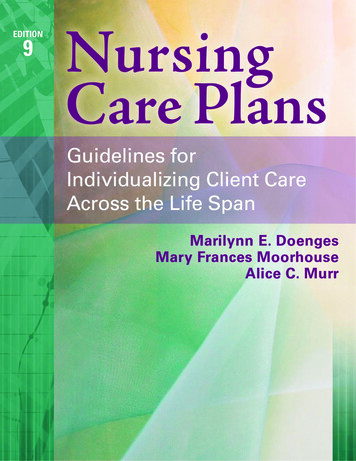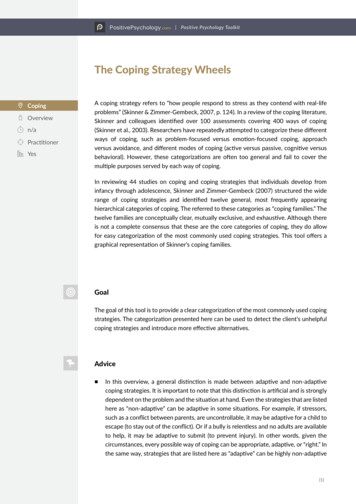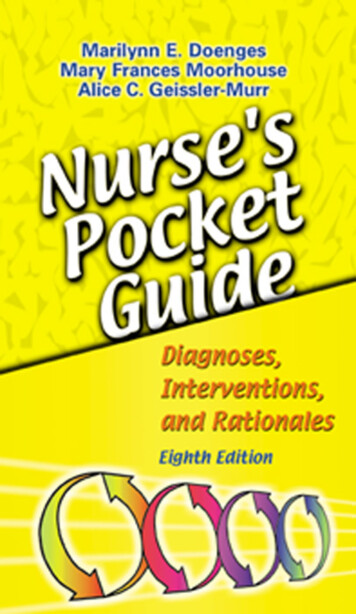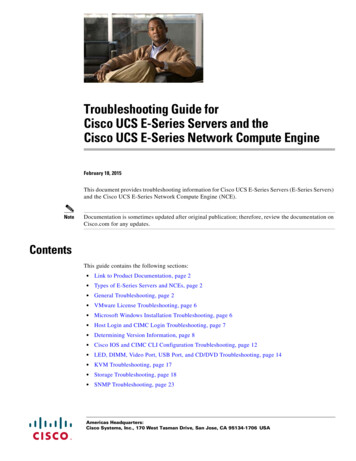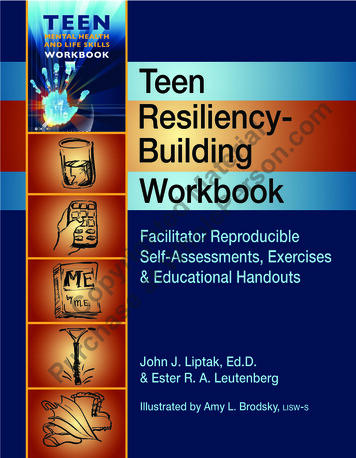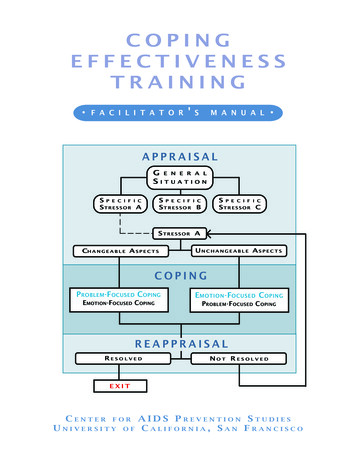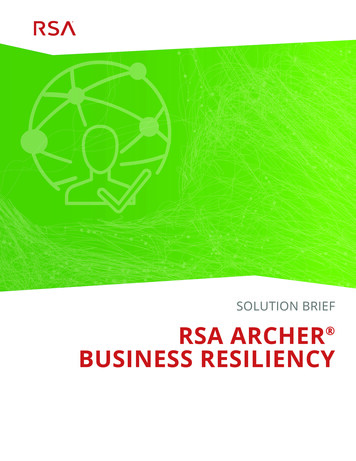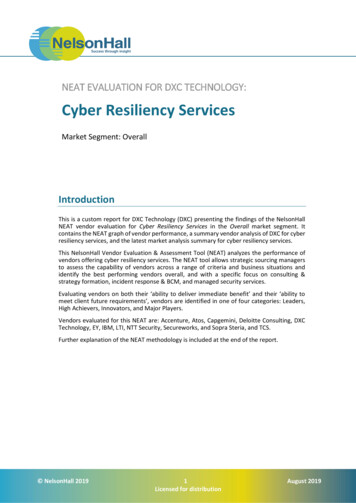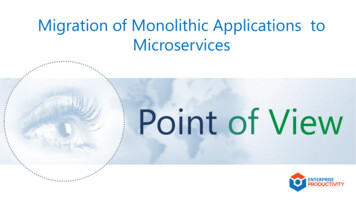
Transcription
Welcome to the webinarResiliency- Coping andRecovering During aPandemicThe webinar will begin at 10:30July 16, 2020
Resiliency- Coping andRecovering During aPandemicCOVID-19 Workshop SeriesJuly 16, 2020
Housekeeping and RequestsFor today’s call, everyone is muted. Please use the Chat box (right side of your screen) for questions andcomments If we are unable to get to your question today, we will follow up with you Use the Chat box to let us know who’s here today – your name,organization and role3
The IPRO QIN-QIOWho We AreThe IPRO QIN-QIO A federally-funded Medicare Quality InnovationNetwork–Quality Improvement Organization (QIN-QIO) 12 regional CMS QIN-QIOs nationallyIPRO:New York, New Jersey, and OhioHealthcentric Advisors:Connecticut, Maine, Massachusetts, NewHampshire, Rhode Island, and VermontQlarant:Maryland, Delaware, and the District of ColumbiaWorking to ensure high-quality, safe healthcare for20% of the nation’s Medicare FFS beneficiaries
Focus Areas Across SettingsNursing HomesCommunity Coalitions Working with morethan 1,500 of thenursing homes inthe region Communities that encompass at least 65% ofthe Medicare beneficiaries in each state Members collaborating to improve outcomesfor the communities they serve:Cross-Cutting Priority Areas Health Information TechnologyHealth EquityTrauma-Informed CarePatient & Family EngagementRural HealthVulnerable Populations Acute Care HospitalsCritical Access HospitalsFederally Qualified HealthCenters Home Health Agencies Skilled Nursing FacilitiesPhysician PracticesPharmaciesCommunity BasedOrganizationsProgram Focus AreasBehavioral Health & Opioid UsePatient SafetyChronic Disease Self-ManagementCare TransitionsNursing Home Quality
Our SpeakersLynn Wilson, MSBehavioral HealthTeamIPROJanet Jones, RDAim Lead,CommunityCoalitions, Qlarant6
Grounding“Box Breathing”Sit in a comfortable position, straight spine and neck, shoulders back anddown, look straight ahead with a gentle gaze.Inhale for count of 4.Hold breath for count of 4.Exhale for count of 4.Hold breath for count of 4. Repeat 4 (or more) times.7
Presentation Overview Identify the culture of resiliency in your organization Use the “Wellness Compass” to gauge and reassess yourstrategies for resiliency Assess how COVID-19 may be impacting your ability toeffectively engage residents/patients and theirfamilies/caregivers in their care Engage with community partners to practice and supportresiliency8
Did you know ?“Scientific evidence the lifespan of anyparticular emotion is only one and a halfminutes. After that we have to revive theemotion and get it going again.”Source: Chodron, Pema. Taking the Leap, Freeing Ourselves from Old Habits and Fears. Boston: Shambhala Publications, 2009.9
The reality of working inhealth care it is both exhilarating and stressful! Caring for people who are suffering can be incredibly rewarding as well as emotionallydraining and physically and intellectually demanding. The stress of working in an evolving practice environment with complex technologies,significant time pressures, and regulatory and organizational demands can take its toll onthe wellbeing and resilience of health care providers that are so vital to optimal care ofclients and career satisfaction. In our efforts to help clients build their physical and emotional health and resilience, we arecharged with the examination of our own capacity personally and professionally to modelthat which we strive to build.“Grief and Resilience Live Together” - Michelle ObamaSource: Compassion Resilience10
Compassion ResilienceResilienceAbility to recover and continue on in the face of adversity without beingoverwhelmed or acting in dysfunctional ways.CompassionCombination of an awareness of others’ distress and a desire to alleviate it –essentially a quality needed to be of benefit to others.CompassionResilienceAbility to maintain our physical, emotional, and mental well-being whileresponding compassionately to people who are suffering.For healthcare workersAbility to maintain our physical, emotional and mental well being whilecompassionately caring for those who are suffering.Identifying and addressing the barriers to caregivers/families and colleagues beingable to effectively partner on behalf of those being served.Identifying, preventing, and minimizing compassion fatigue within ourselves.Source: Compassion Resilience 11
“Culture eats strategy for breakfast”- Peter DruckerThe most important thing about culture is that it’s the onlysustainable point of difference for any organization.Anyone can copy your strategy, but nobody can copyyour culture If your culture is strong then it gainspower through inspiring your people.1Research has demonstrated a linkage between organizationalculture and staff experience of compassion fatigue.2Sources:1 Management Issues: Why culture is more important than strategy?2 Condrey, Katherine M. The Relationship between Compassion Fatigue and Organizational Culture. Diss. George Fox University, 2015.12
Wellness Compass“Our fatigue is often caused not bywork, but by worry, frustration, andresentment.” Dale Carnegie“The calm and balanced mind is thestrong and great mind; the hurriedand agitated mind is the weak one.” Wallace D. WattlesSource: Wellness and Resilience Strategies: Wellness Compass13
A Few Resources and Tools Compassion in Action Steps Compassion Fatigue Cycle Professional Quality of Life Scale (PROQOL) Appreciative Inquiry Reflection on Competence14
Compassion Resilience toCommunity ResilienceIHI’s Triple Aim and Quadruple AimImproving CareImprovingHealthOutcomesLowering HealthCostsImprovingProvider WellBeing PositiveImpacts on allFronts15
Compassion Resilience toCommunity ResilienceMoving from Internal Healing to External HealingInternal (inside our facility walls –we work with them day to day)External (outside our facility wallsor come into our buildings)Ourselves, Leadership, Co-workersPatient’s Families, Our Family, FriendsPatientsHealthcare workers at other facilitiesMoving from Compassion Fatigue to Compassion Resilience Action16
Compassionate Engagementof Patient and FamiliesMotivatedEmpoweredAble to recognize their needsAble to state their strengthsTake an active role in changing things for the better.“Involvement in services is important, but real engagement goes beyond that. Families canbe involved and compliant without being engaged. Engagement is what keeps familiesworking in the sometimes slow process of positive change.”Source: Listening deeply: Engaging the Community17
Compassionate Engagement ofPatients and Family (and Others)Six steps for compassionate action when families/caregivers are distressed:NoticeSelf-CheckSeek to understandCultivate empathyDiscern best actionTake action18
Community ResilienceAn intentional Focus The ability of a community to use its assets to strengthen public healthand to improve the community's physical, behavioral and social healthto withstand, adapt to and recover from adversity. Dept of Health andHuman Services Resilient communities promote individual and community physical,behavioral, and social health to strengthen their communities for daily,as well as extreme, challenges.19
Community ResilienceAn intentional Focus IPRO QIN-QIO Community Coalitions: leaders, staff, patients,community organizations, nursing homes, hospitals, pharmacists, otherfacility types (anyone that may potentially touch a patient in theirhealthcare journey).How are you talking with your external partners?How well are you using the six tools mentioned above?Is there no blame involved?Do you ask how are you feeling – across all levels of organization and “outside ofthe your walls”? (e.g., Leaders/1:1)Working together we are stronger and able toprovide better care for our communities.20
Discussion QuestionsPlease respond in the chat?1. Has your communication with community partners changed in the lastthree months and if so how?2. How has your organization or practice supported your own resilience inthe past three months?3. Considering the last three months, can you recall a time you felt excitedabout your work?21
Resources Wise Wisconsin: Compassion Resilience The Schwartz Center for Compassionate Healthcare “What Happens to Compassion During an Opioid Epidemic?“ t-effect-outcomefrontline-workers/ Healthy Break ActivitiesTo learn more about working with us Nursing Home Quality Care Collaborative Community of Care Coalitions22
Learn More & Stay Connectedhttps://qi.ipro.org/This material was prepared by the IPRO QIN-QIO, a collaboration of Healthcentric Advisors, Qlarant andIPRO, serving as the Medicare Quality Innovation Network-Quality Improvement Organization for the NewEngland states, NY, NJ, OH, DE, MD, and the District of Columbia, under contract with the Centers forMedicare & Medicaid Services (CMS), an agency of the U.S. Department of Health and Human Services.The contents do not necessarily reflect CMS policy. 12SOW-IPRO-QIN-TA-AA-20-136Follow IPRO QIN-QIO
Source: Chodron, Pema. Taking the Leap, Freeing Ourselves from Old Habits and Fears. Boston: Sh
